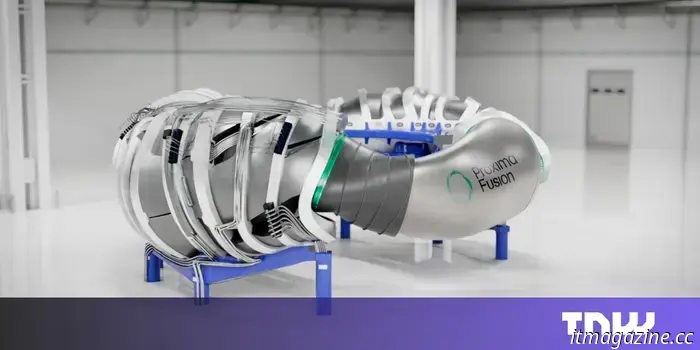
Fusion energy might be 'crucial' for the energy security of Europe.
Europe's energy security is under significant threat due to its heavy reliance on imported fossil fuels and renewable energy technologies from countries like the US, China, and Russia. One possible solution? Tapping into nuclear fusion—the very reaction that fuels the Sun and stars.
Although not yet commercially viable, fusion energy has the potential to offer Europe a crucial source of safe, locally generated, and reliable clean power. Additionally, future fusion power plants are expected to operate on abundant fuels such as deuterium and tritium, which are not limited to specific regions.
Francesco Sciortino, co-founder and CEO of the German startup Proxima Fusion, believes that fusion energy can serve as a complement to wind and solar power, playing a “decisive building block” role in enhancing Europe’s energy security.
“Fusion has the potential to change fundamentally our perspective on energy, transitioning from a world dominated by those with oil and gas reserves to one where technology enables countries to govern their own energy destinies,” he stated to TNW.
One of the most advanced approaches to fusion globally is magnetic confinement. These toroidal machines employ strong magnetic fields to confine superheated plasma, facilitating the conditions necessary for fusion reactions. Europe is already ahead in this technology.
“Europe excels in magnetic confinement fusion, boasting about twice the number of researchers and large-scale fusion devices compared to the US,” noted Sciortino.
Proxima, the first spinoff from the Max Planck Institute of Plasma Physics in Germany, is constructing a type of magnetic confinement device known as a stellarator. This design differs from the more prevalent tokamak design utilized in major international projects such as ITER in France and STEP in the UK.
Although building stellarators is more complex, they offer several advantages over tokamaks. They require less energy to operate and facilitate easier plasma control. This stability is essential for a functional fusion energy facility.
Germany is home to the most advanced stellarator, Wendelstein 7-X, setting the groundwork for Proxima’s Stellaris reactor design, which was unveiled in February.
Stellaris is expected to be completed in just six years, forming the basis for Proxima’s inaugural 1GW fusion reactor, which the company anticipates will commence operation in the 2030s.
Proxima is part of a growing number of fusion energy startups, many based in Europe, vying to commercialize this technology. Among the most well-funded are the UK’s Tokamak Energy and Germany’s Marvel Fusion.
The outlook for fusion energy is optimistic. Despite the cliché that it’s always “30 years away,” a survey from the Fusion Industry Association revealed that 70% of experts believe a fusion device will be supplying the grid by 2035.
If these forecasts hold true, fusion could play a significant role in Europe’s renewable energy portfolio, offering unique benefits. Unlike wind or solar energy, fusion can provide uninterrupted power. Moreover, unlike fossil fuels, much of which is imported from nations like Russia and the US, fusion is clean and has the potential to be domestically sourced, thereby enhancing energy security.
However, with the US taking the lead in private fusion investments, Sciortino cautioned that Europe risks losing its edge and called on governments to support burgeoning startups.
“This is a crucial time for Europe—a moment where we have the opportunity to make decisions that will shape the coming decades and to establish a lead in the global race for commercial fusion,” he emphasized. “Europe must seize this moment; it cannot afford to waste the opportunity and must invest in companies striving towards our continent’s energy security and independence.”
The topic of European sovereignty will be a focal point at the TNW Conference, scheduled for June 19-20 in Amsterdam. Tickets for the event are currently available—use the code TNWXMEDIA2025 at checkout to receive a 30% discount.
Other articles
 NYT Mini Crossword today: solutions for Tuesday, April 22
The NYT Mini crossword may be significantly smaller than a standard crossword, but it's still quite challenging. If you're having trouble with today's puzzle, we have the solutions for you.
NYT Mini Crossword today: solutions for Tuesday, April 22
The NYT Mini crossword may be significantly smaller than a standard crossword, but it's still quite challenging. If you're having trouble with today's puzzle, we have the solutions for you.
 CATL claims that its next-generation dual-power electric vehicle battery will provide a range of 930 miles.
At a press event in Shanghai, founder and chairman Robin Zeng informed reporters that dual-power batteries could offer customers more comprehensive capabilities compared to traditional batteries.
CATL claims that its next-generation dual-power electric vehicle battery will provide a range of 930 miles.
At a press event in Shanghai, founder and chairman Robin Zeng informed reporters that dual-power batteries could offer customers more comprehensive capabilities compared to traditional batteries.
 5 films departing Amazon Prime Video in April 2025 that you need to see
These timeless films remain enjoyable, highlighting five movies departing from Amazon Prime Video in April 2025 that you should see.
5 films departing Amazon Prime Video in April 2025 that you need to see
These timeless films remain enjoyable, highlighting five movies departing from Amazon Prime Video in April 2025 that you should see.
 Marvel Rivals Season 2 Battle Pass: how to obtain and unlock all items
Marvel Rivals Season 2 features an impressive Battle Pass packed with Hellfire Gala themed outfits and additional items.
Marvel Rivals Season 2 Battle Pass: how to obtain and unlock all items
Marvel Rivals Season 2 features an impressive Battle Pass packed with Hellfire Gala themed outfits and additional items.
 Can construction robots address Europe’s housing crisis?
Monumental CEO Salar al Khafaji, who spoke at this summer's TNW Conference, thinks that robotics are essential for alleviating the housing crisis.
Can construction robots address Europe’s housing crisis?
Monumental CEO Salar al Khafaji, who spoke at this summer's TNW Conference, thinks that robotics are essential for alleviating the housing crisis.
 NYT Strands for today: clues, spangram, and solutions for Tuesday, April 22.
Strands offers a challenging twist on the traditional word search from NYT Games. If you're having difficulty and can't figure out today's puzzle, we've got assistance and clues for you right here.
NYT Strands for today: clues, spangram, and solutions for Tuesday, April 22.
Strands offers a challenging twist on the traditional word search from NYT Games. If you're having difficulty and can't figure out today's puzzle, we've got assistance and clues for you right here.
Fusion energy might be 'crucial' for the energy security of Europe.
The CEO of Proxima Fusion stated that fusion energy has the potential to lessen Europe's reliance on foreign nations like the US, China, and Russia.
